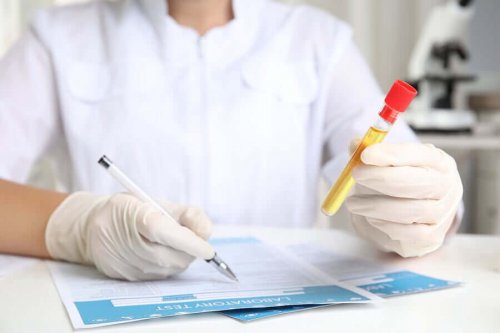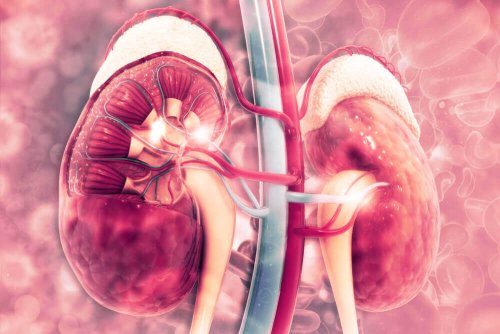Low Creatinine Levels and Treatments


Written and verified by the doctor Leonardo Biolatto
Coming to the conclusion that a person has low creatinine levels isn’t easy and it doesn’t happen immediately in the general population. Doctors usually only measure these values among people who already have kidney disease.
Creatinine is a biochemical parameter of blood and urine, which is strongly linked to the kidneys. It’s one of the usual routine exams nephrologists use as a follow-up on their patients’ state of health.
This substance is, in reality, a waste produced by muscle metabolism. Thus, when our muscle fibers work, they generate creatinine as a product that they should subsequently eliminate. The usual route of elimination is through the kidneys and urine.
So, this is how we can track creatinine in the blood and urine to measure it. In the blood, we find it as recently manufactured muscle waste. And, in the urine, we measure how much of it leaves our body.
Even though it’s common for doctors to measure blood creatinine only during general consultations, they should also measure it in the urine when they suspect a kidney disease. For this purpose, the most appropriate method is creatinine clearance.
Through the comparison between the levels of the substance in the blood and urine, we can detect specific abnormalities. For instance, if there’s a low level of creatinine in the urine and a high level in the blood then kidney failure is very likely.
Creatinine clearance
This is a very useful test to detect low urine creatinine levels. All denominations identify the same methods and their objective is to report how much blood creatinine the kidneys are filtering.
To arrive at the result, a doctor must take blood and urine samples. They must collect urine for a full day/twenty-four hours, and then deliver it to a lab for analysis.
Once there, the biochemist will use the corresponding techniques and then apply a formula called glomerular filtration rate. This rate, which is a mathematical formula, measures the filtration power the kidneys might have at any given time.
The expression of values is in millimeters per minute, and the numbers considered normal are:
- From 97 to 137 mL/min in men
- For women, 88 to 128 mL/min

Keep reading: Seven Signs of Kidney Problems
Causes of low creatinine levels
After doing the corresponding tests and detecting there are in fact low levels of creatinine in a urine sample, then a doctor might suspect:
- Renal impairment. This is a serious problem in the urinary system. It means that the kidneys cannot fulfill their basic blood filtration function and are accumulating toxic waste in the blood. It requires the immediate involvement of a nephrologist and other complementary tests.
- Loss of muscle mass. When creatinine levels are low both in the urine and in the blood, there may be a loss of muscle mass. Creatinine levels decrease by decreasing muscle metabolism. This is common in old people and in those who go through periods of sudden weight loss.
- Diet. A low intake of proteins deprives the body of raw material with which to “feed” the muscles. Therefore, it also decreases muscle metabolism and the levels of creatinine decrease.
- Gestation. There are concurrent situations that alter the dynamics of the kidneys during pregnancy. In itself, the production of creatinine usually decreases physiologically. But it can also be a sign of severity due to a complicated urinary infection or changes in blood pressure that could result in preeclampsia or eclampsia.
- Autoimmune diseases. Some autoimmune diseases such as Myasthenia gravis (MG) and some muscular dystrophies attack both the muscles and the kidneys. In general, other altered parameters are detected before creatinine levels go down.

Find out more: Hypertension and Kidney Failure
Treatment for low creatinine levels
The treatment for low creatinine levels will depend exclusively on the cause. It’s not the same to treat kidney failure than to treat a deficient diet or a pregnant patient.
You must consult a nephrologist when confronted with renal insufficiency. Some diseases that lead to kidney failure can be treated with medications and special care, while others inevitably lead to dialysis.
The risk is significant in pregnant women. Obstetricians and gynecologists use certain pregnancy-friendly medications to treat kidney disorders. When eclampsia is the clinical picture then they advise hospitalization in order to be in control of the parameters.
Finally, nutritional measures can be evaluated when the diet lacks protein or when there’s a loss of muscle mass. Nutritionists can put together an eating plan with which to increase protein intake, as well as recommending some muscle-toning exercises.
Finally, low levels of creatinine in urine shouldn’t be neglected. Thus, you must follow-up with a doctor and their indications to prevent serious complications.
All cited sources were thoroughly reviewed by our team to ensure their quality, reliability, currency, and validity. The bibliography of this article was considered reliable and of academic or scientific accuracy.
- Perazzi, Beatriz, and Margarita Angerosa. “Creatinina en sangre: calidad analítica e influencia en la estimación del Índice de Filtrado Glomerular.” Acta bioquímica clínica latinoamericana 45.2 (2011): 265-272.
- Gorozobel, Chávez, Tola Torres, and Janeth del Carmen. “Aclaramiento de creatinina en orina de 2 horas vs 24 horas en pacientes con insuficiencia renal para estimar el filtrado glomerular, en el Hospital General Guasmo Sur en un periodo de 5 meses.” (2018).
- Zenteno, Jorge, et al. “Correlación entre el aclaramiento de creatinina y la fórmula MDRD-4 en la estimación del filtrado glomerular.” Memorias del Instituto de Investigaciones en Ciencias de la Salud 9.2 (2011).
This text is provided for informational purposes only and does not replace consultation with a professional. If in doubt, consult your specialist.








